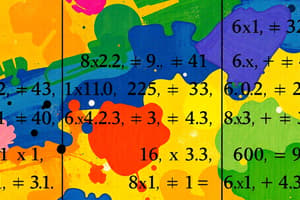Podcast
Questions and Answers
What type of interval has finite real numbers as end points?
What type of interval has finite real numbers as end points?
- Half-closed interval
- Finite interval (correct)
- Infinite interval
- Half-open interval
Which of the following intervals is considered closed?
Which of the following intervals is considered closed?
- (−∞, b]
- [a, + ∞] (correct)
- [a, + ∞)
- (a, − ∞)
What is the set of all solutions of an inequality called?
What is the set of all solutions of an inequality called?
- Unknown set
- Solution set (correct)
- Variable set
- Inequality set
What operation should not be performed on both sides of an inequality?
What operation should not be performed on both sides of an inequality?
What is the solution set of the inequality x < 5?
What is the solution set of the inequality x < 5?
Which of the following is a solution of the inequality x < 5?
Which of the following is a solution of the inequality x < 5?
What is the type of interval that has no endpoints?
What is the type of interval that has no endpoints?
What is special about the intervals (a, − ∞) and (−∞, b)?
What is special about the intervals (a, − ∞) and (−∞, b)?
What is the purpose of the theorem mentioned in the passage?
What is the purpose of the theorem mentioned in the passage?
What is the purpose of the pause in the passage?
What is the purpose of the pause in the passage?




